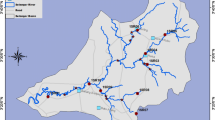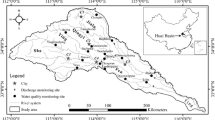Abstract
Herein, cluster analysis was applied to evaluate the spatiotemporal variations in water quality variables of a river. The analysis was performed using the data obtained from 15 monitoring stations during 2007–2018 in the Yeongsan River, Republic of Korea. The spatiotemporal analysis successfully clustered the annual water quality variables temporally into years of poor water quality (2007–2012) and good water quality (2013–2018), and spatially into stations observing bad water quality (midstream) and good water quality (upstream and downstream). For the spatial cluster analysis results before and after a large river engineering project, the water quality was grouped into four clusters according to regional effects and water pollutant sources. The clustering analysis results clearly reflected changes in the water quality along the river due to the project. Overall, this study demonstrates that cluster analysis can be effectively used for evaluating spatiotemporal variations in river water quality.









Similar content being viewed by others
References
Achieng AO, Raburu PO, Kipkorir EC, Ngodhe SO, Obiero KO, Ani-Savwa J (2017) Assessment of water quality using multivariate techniques in River Sosiani, Kenya. Environ Monit Assess 189(6):280. https://doi.org/10.1007/s10661-017-5992-5
Atique U, An KG (2019) Reservoir water quality assessment based on chemical parameters and the chlorophyll dynamics in relation to nutrient regime. Pol J Environ Stud 28(3):1043–1061. https://doi.org/10.15244/pjoes/85675
Barakat A, Baghdadi ME, Rais J, Aghezzaf B, Slassi M (2016) Assessment of spatial and seasonal water quality variation of Oum Er Rbia River (Morocco) using multivariate statistical technique. Int Soil Water Conserv Res 4(4):284–292. https://doi.org/10.1016/j.iswcr.2016.11.002
Choi KC, Byoun OA, Kim YD, Kim YH, Lee US, Lee ZY, Chon SJ, Chung SK (2003) Annotation for standard methods of water quality, 3rd edn. Donghwa Technology Publishing Co., Seoul (In Korean)
Choi OY, Kim HT, Seo HS, Han IS (2017) Analysis of water quality changes & characterization at the watershed in Han River Basin for target indicator in TMDLs. J Korean Soc Water Environ 33(1):15–33. https://doi.org/10.15681/KSWE.2017.33.1.15
Everitt B (1993) Cluster analysis, 3rd edition. Edward Arnold, London.
GMC (Gwangju Metropolitan City) (2017) White-paper for the policy of Gwangju Metropolitan City. 773–778. http://gwangju.go.kr/html/down/04/2017/1-1_2017.pdf. Accessed 15 Nov 2019.
Helsel DR, Hirsch RM (2002) Statistical methods in water resources. Techniques of water-resources investigations of the United States Geological Survey. Book 4, Hydrologic Analysis and Interpretation, Chapter A3. U.S. Geological Survey (USGS), Reston. http://water.usgs.gov/pubs/twri/twri4a3. Accessed 15 Nov 2019.
Hirsch RM, Slack JR (1984) A nonparametric trend test for seasonal data with serial dependence. Water Resour Res 20(6):727–732. https://doi.org/10.1029/WR020i006p00727
Hirsch RM, Slack JR, Smith RA (1982) Techniques of trend analysis for monthly water quality data. Water Resour Res 18(1):107–121. https://doi.org/10.1029/WR018i001p00107
Johnson SC (1967) Hierarchical clustering schemes. Psychometrika 32:241–254. https://doi.org/10.1007/BF02289588
Jung SJ, Lee DJ, Hwang KS, Lee KH, Choi KC, Im SS, Lee YH, Lee JY, Lim BJ (2012) Evaluation of pollutant characteristics in Yeongsan River using multivariate analysis. Korean J Eco Environ 45(4):368–377. https://doi.org/10.11614/KSL.2012.45.4.368
Kang SA, Ahn KG (2006) Spatio-temporal variation analysis of physico-chemical water quality in the Yeongsan-River watershed. Korean J Eco Environ 39(1):73–84
Kendall MG (1975) Rank correlation methods. Charles Griffin, London
Kim MA, Lee SY, Mun HS, Cho HS, Lee JK, Kim KH (2017) A nonparametric trend tests using TMDL data in the Nakdong River. J Korean Soc Water Environ 33(1):40–50. https://doi.org/10.15681/KSWE.2017.33.1.40
Lee BM, Lee TH, Hur J (2011) Development of estimation indices for refractory organic matter in the Han-River Basin using organic matter parameters and spectroscopic characteristics. J Korean Soc Water Environ 27(5):625–633
Leenheer JA, Croué JP (2003) Characterizing aquatic dissolved organic matter. Environ Sci Technol 37(1):18A–26A. https://doi.org/10.1021/es032333c
Liu CW, Linn KH, Kuon YM (2003) Application of factor analysis in the assessment of groundwater quality in a black foot disease area in Taiwan. Sci Total Environ 313:77–89. https://doi.org/10.1016/S0048-9697(02)00683-6
MacQueen J (1967) Some methods for classification and analysis of multivariate observations. Proc fifth Berkeley Symp on Math Statist and Prob 1:281–297
Magyar N, Hatvani IG, Szekely IK, Herzigc A, Dinka M, Kovacs J (2013) Application of multivariate statistical methods in determining spatial changes in water quality in the Austrian part of Neusiedler See. Ecol Eng 55:82–92. https://doi.org/10.1016/j.ecoleng.2013.02.005
Mann HB (1945) Nonparametric tests against trend. Econometrica. 13:245–249. https://doi.org/10.2307/1907187
Mena-Rivera L, Salgado-Silva V, Benavides-Benavides C, Coto-Campos JM, Swinscoe TH (2017) Spatial and seasonal surface water quality assessment in a tropical urban catchment: Burío River, Costa Rica. Water 9(8):558. https://doi.org/10.3390/w9080558
Pinto CC, Calazans GM, Oliveira SC (2019) Assessment of spatial variations in the surface water quality of the Velhas River Basin, Brazil, using multivariate statistical analysis and nonparametric statistics. Environ Monit Assess 191(3):164. https://doi.org/10.1007/s10661-019-7281-y
Sargaonkar A, Deshpande V (2003) Development of an overall index of pollution for surface water based on a general classification scheme in Indian context. Environ Monit Assess 89:43–67. https://doi.org/10.1023/A:1025886025137
Seo MJ, Cho CD, Im TH, Kim SH, Yoon HJ, Kim YS, Kim GH (2019) Statistical analysis of the spatio-temporal water quality characteristics of the Nakdong River. J Environ Sci Int 28(3):303–320. https://doi.org/10.5322/JESI.2019.28.3.303
Shen YN, Lu J, Chen DJ, Shi YM (2011) Response of stream pollution characteristics to catchment land cover in Cao–E River Basin, China. Pedosphere 21(1):115–123. https://doi.org/10.1016/S1002-0160(10)60086-0
Shin JK, Kang BG, Hwang SJ (2016) Limnological study on spring-bloom of a green algae, Eudorina elegans and weirwater pulsed flows in the midstream (Seungchon Weir Pool) of the Yeongsan River, Korea. Korean J Eco Environ 49(4):320–333. https://doi.org/10.11614/KSL.2016.49.4.320
Shrestha S, Kazama F (2007) Assessment of surface water quality using multivariate statistical techniques: A case study of the Fuji River Basin, Japan. Environ Model Softw 22(4):464–475. https://doi.org/10.1016/j.envsoft.2006.02.001
Simeonov V, Stratis JA, Samara C, Zachariadis G, Voutsa D, Anthemidis A, Sofoniou M, Kouimtzis T (2003) Assessment of the surface water quality in Northern Greece. Water Res 37(17):4119–4124. https://doi.org/10.1016/S0043-1354(03)00398-1
Song ES, Jeon SM, Lee EJ, Park DJ, Shin YS (2012) Long-term trend analysis of chlorophyll a and water quality in the Yeongsan River. Korean J Eco Environ 45(3):302–313
Sun X, Zhang H, Zhong M, Wang Z, Liang X, Huang T, Huang H (2019) Analyses on the temporal and spatial characteristics of water quality in a seagoing river using multivariate statistical techniques: a case study in the Duliujian River, China. Int J Environ Res Public Health 16(6):1020. https://doi.org/10.3390/ijerph16061020
Vega M, Pardo R, Barrado E, Debán L (1998) Assessment of seasonal and polluting effects on the quality of river water by exploratory data analysis. Water Res 32(12):3581–3592. https://doi.org/10.1016/S0043-1354(98)00138-9
Ward JH (1963) Hierarchical grouping to optimize an objective function. J Am Stat Assoc 58(301):236–244. https://doi.org/10.1080/01621459.1963.10500845
Yu SJ, Lee EJ, Park MJ, Kim KS, Im JK, Ryu IG, Choi HJ, Byeon MS, Noh HR (2018) Changes in the water environment based on the statistical data in the Lake Paldang. J Korean Soc Water Environ 34(6):688–702. https://doi.org/10.15681/KSWE.2018.34.6.688
Yun JH, Hwang SW, Kim DH, Kim SM (2015) Trend analysis of monthly water quality data in Nakdong River based on Seasonal Mann-Kendall Test. J Korean Soc Agric Eng 57(6):153–162. https://doi.org/10.5389/KSAE.2015.57.6.153
Zhang X, Wang Q, Liu Y, Wu J, Yu M (2011) Application of multivariate statistical techniques in the assessment of water quality in the Southwest New Territories and Kowloon, Hong Kong. Environ Monit Assess 173:17–27. https://doi.org/10.1007/s10661-010-1366-y
Funding
This work was supported by a grant from the National Institute of Environment Research (NIER), funded by the Ministry of Environment (MOE) of the Republic of Korea (NIER-2019-03-01-013).
Author information
Authors and Affiliations
Corresponding authors
Ethics declarations
Conflict of interest
The authors declare that they have no conflict of interest.
Additional information
Responsible Editor: Xianliang Yi
Publisher’s note
Springer Nature remains neutral with regard to jurisdictional claims in published maps and institutional affiliations.
Rights and permissions
About this article
Cite this article
Lee, KH., Kang, TW., Ryu, HS. et al. Analysis of spatiotemporal variation in river water quality using clustering techniques: a case study in the Yeongsan River, Republic of Korea. Environ Sci Pollut Res 27, 29327–29340 (2020). https://doi.org/10.1007/s11356-020-09276-0
Received:
Accepted:
Published:
Issue Date:
DOI: https://doi.org/10.1007/s11356-020-09276-0




